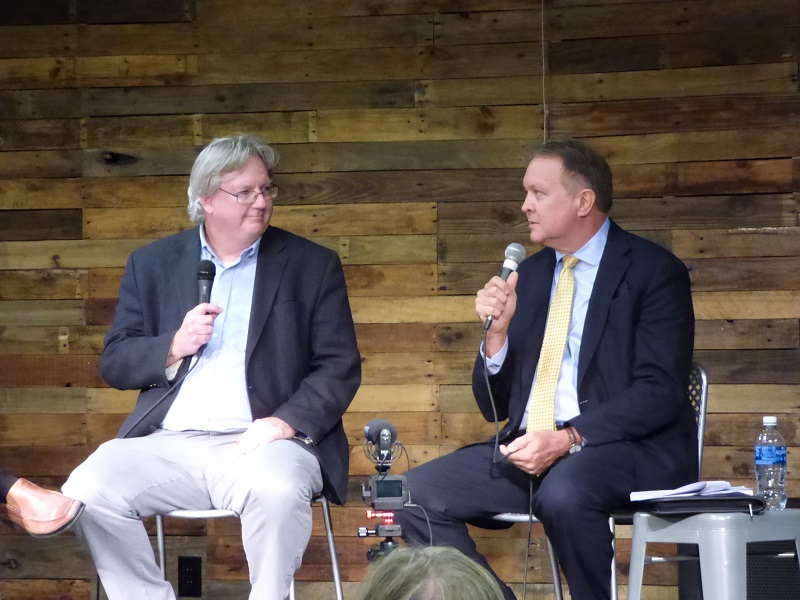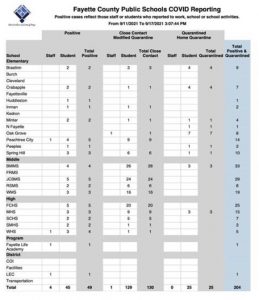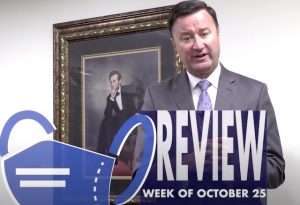The worry is that if voters approve homestead exemption bill in November, school funding will be hurt in the future —
The Fayette County Board of Education on Aug. 24 adopted a resolution opposing (stated as not supporting) House Bill 1166 up for a public vote on Nov. 3. School board members, on a 4-1 vote, said the homestead exemption capping the property tax money the school board could tax at 3 percent could have a long-term negative impact on public schools.
A “Yes” vote Nov. 3 would shield any increased value of a home “in the amount of the difference between the current year assessed value of a homestead and its lowest base year value, provided that the lowest base year value will be adjusted yearly by the lesser of 3 percent or the inflation rate,” The Citizen previously reported.
The local legislation, written by Rep. Josh Bonner (District 72), Rep. Philip Singleton (R-Sharpsburg, District 71) and Rep. Karen Mathiak (R-Griffin, District 73), received only two “No” votes in the General Assembly. All Democratic legislators who represent portions of Fayette also did not oppose the bill, Sen. Marty Harbin said.
Superintendent Jody Barrow at the Aug. 24 meeting said he understood where the referendum was coming from and had great appreciation for that, adding that “I think this cure would be worse than the disease, I’m afraid. I really do believe that if this piece of legislation passes here in Fayette it will have a long-term negative impact on the school district.”
The school board resolution maintains that passage of the referendum by voters could potentially affect the district budget specifically for:
- staffing levels at schools increasing class sizes,
- decreasing funding for additional paraprofessionals above the positions required by state law,
- competitive teacher salary schedule,
- plans or timing of reopening of previously closed schools due to funding constraints forcing redistricting of attendance zones and larger school sizes,
- and specialized curricular programs and initiatives such as the Community for Creativity, International Baccalaureate program, world language paraprofessionals in the elementary level, and graduation coaches.

Board member Brian Anderson during the discussion said he liked that the referendum is on the ballot, from a perspective of voter choice, but questioned the potential loss of several million dollars in revenues over several years.
“We’re talking about two elementary schools worth of teachers. So one option would be to close two schools to come up with the money, or reduce at a bunch of schools, or increase class sizes or any number of things.”
Also weighing-in was board member Barry Marchman who said, “I didn’t have a lot of input on this. The reasons I’m not going to support it — I don’t agree with the premise. The premise is that we’re going to harm Fayette County schools if we put some kind of check-and-balance on our unlimited ability to raise taxes. We live in a system of government where we have checks and balances. I looked up all of our taxes. From the time I’ve been on the board (2013), we’ve raised taxes about 50 percent, and in this resolution, it says we’ve actually lowered the millage rate over the past four years, but we’ve still increased taxes over 20 percent.”
Marchman said that 2.5 percent this year is petty reasonable but, “To dip into (taxpayers) pockets a little bit more in these tough times and then pass a resolution saying let us tax you as much as we want to without any checks and balances … I don’t see a lot of good will for our community coming from this.”
Anderson followed, saying said he liked that the referendum is on the ballot, adding that, “I don’t know how the make the math work.”
Setting the millage rate is a core function of a school board’s local control, Anderson said.
“I guess, to me, (the referendum put on the ballot by state representatives) rips asunder the very fabric of the notion of the school board… What if we ripped away the ability of the police to arrest somebody? As dumb as that is, that’s how dumb it is to take the five elected (board members)… If you think about it, if we were hired or elected to make this decision, it’s kind of the sole reason we are here.”
Marchman responded, saying that the school board could still raise the tax rate up to the 20-mill maximum and still gets 3-3.5 percent a year on property assessments, and when people come and go the board gets the full assessment.
“So I’m not sure how much (HB 1166) is going to restrain us in the future,” Marchman said, adding that “I agree that we need to maintain the right to set the millage rate and raise and lower taxes for the school board. But when the property assessments go way up and we cut the millage rate just a little, the people through their state legislators have cried for a remedy. Maybe it won’t pass, and maybe it will give us a wake-up call.”
“Or maybe the wake-up call will be on the other side,” Anderson added.

Board member Leonard Presberg then commented, saying, “I think it is easy to see that putting a cap on the potential growth of the tax digest is a limit to future school boards and to our system in general. And I’m not sure why, especially in a year like this year, where we had such a tremendous cut in our state funds (that amount was approximately $10 million) and continue to see the state pay a smaller and smaller percentage of our education budget, it’s not perfectly appropriate for us as a school board to say we think (the passage by voters) will limit teachers/school boards in a way that’s absolutely going to affect public education in this county. I’m perfectly happy with this resolution.”
During the board’s discussion on the resolution later in the meeting and just prior to the vote, Anderson said he thought the portion of the resolution stating that “the new exemptions would potentially affect the revenues and therefore the budget of the school district, potentially resulting in reduced instructional staff for students, teacher pay rates, and operating funds for appropriate and necessary expenditures,” should be modified to include closing buildings.
“If it passes, I intend to move in that manner,” Anderson said in advocating that the resolution be modified. “I will advocate for that, if need be, to make up the (potential millions in shortfalls if the referendum passes). What we need to understand is when does the millions (in) shortage happen. It might be four or five years from now. I think we all need to be open to that as a possibility.”
Chairman Scott Hollowell said he was alright with the resolution as worded, since “This is the beginning of us telling our story.”
“I don’t think it’s going to be the final word. Since it’s coming from the school system, we’re trying to keep it factual,”‘ Hollowell said. “(Assistant Superintendent) Tom (Gray) and Dr. Barrow are trying to point out what they see as the shortcomings.”
Anderson responded, saying that since the board is signing the resolution, “It should reflect what we want. I didn’t author it. I would have authored a sterner document.”
Board member Leonard Presberg responded saying, “This is our joint statement. I have a lot to say about this that’s not included here. But I think, as a joint statement, for today as a way to start the conversation with the community, I think it’s a general outline of our position.”
Marchman also joined the conversation, saying, “I just want to reiterate that we’re going to have to humbly educate our constituents if we want this referendum to fail, and I think if we take an arrogant or defensive posture, I think we will ensure it’s passing. I really don’t agree with some of the premise of (some of the positions included in the resolution), so I will not support the resolution.
The vote followed, with Marchman with lone board member opposing the resolution.
The reader is encouraged to listen to the discussion online. The agenda items, and a copy of the resolution, were listed on the agenda as items 6d and 11e and is available at https://simbli.eboardsolutions.com/SB_Meetings/ViewMeeting.aspx?S=4067&MID=87465
The board meeting video can be viewed in its entirety at https://drive.google.com/file/d/1oXoOni7zld1LqBiDJyt11H8COklLmGsd/view
As previously reported in The Citizen, the Fayette referendum in November — if approved by a majority of local voters — will create a new homestead exemption for residential property owners that will decrease much of the yearly pain of higher assessed values leading automatically to higher tax collections even without millage rate increases.
In effect, the bill says to the school board, you can collect taxes on what my home is worth this year, but if its value increases next year above its base year value, you can have access only to the additional 3 percent of that increased value or that’s year’s inflation rate, whichever is lower.
For example, in a very simplified version, suppose my home is valued at $100,000 and then next year the value is assessed at $110,000, which represents a 10% increase in value. For the school board’s purposes, my home’s value has increased only to $103,000, a 3% increase. That decreases the amount of school board taxation on my home.
Commenting on the bill, Rep. Josh Bonner recently said, “Fayette County currently spends approximately $11,000 per student per year for a student population of 20,528. The student population has seen little, if any, growth over the last few years yet the budget for the FCBOE has increased significantly,” Bonner said. “Government will spend every dime it takes. We owe it to our constituents to make sure the power to reach into our pockets and take our hard-earned money is limited as much as possible and that every penny is spent in a manner to maximize a return.”












Leave a Comment
You must be logged in to post a comment.